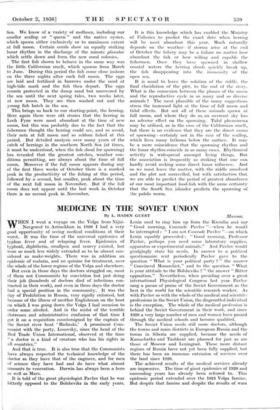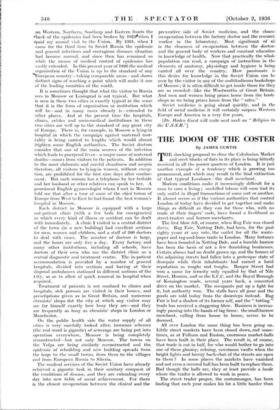MEDICINE IN THE SOVIET UNION
WHEN went a voyage on the Volga from Novgorod to .Astrack.han in 1920 I had a very good opportunity .of seeing medical conditions at their worst.. It .was the time of the universal epidemics of typhus , fever • and of relapsing fever. Epidemics of typhoid, .diphtheria,. smallpox and scurvy .existed, but were so much less widely extended as to be almost con- sidered as. make-weights.. There was in addition an epidemic of malaria, and no quinine for treatment, over the whole of the lower regions of the Volga and elsewhere.
But even in, those days the doctors struggled on, most of them not. Communists by conviction but just doing their job (hundreds of doctors died of infections con- tracted in their work), and even in those days the doctor had a special position in the community. It was the day of Prohibition in Russia, very rigidly enforced, but because. of the illness of another Englishman on the boat on which.I. was going down the Volga I had occasion to order some alcohol. And in the midst of the terrible distresses . and administrative confusion of that time I got it on a requisition countersigned by the captain of the. Soviet ,river. boat Bielinski.' A prominent Com- munist with the party, Losovsky, since the head of the Red Trade Union International, observed at the time " a doctor is a kind of creature who has his rights in all countries." • And that is.true. . It is also, true.that the Communists have always respected the technical knowledge of the doctor as they have that of the engineer,: and for men of science they have had and do. have what almost amounts to veneration. Darwin, has always been a hero as well as 'Marx. • „It is told of the great physiologist. Pavlov that he was bitterly opposed, to the Bolsheviks in the early years: Lenin used to ring him up from the Kremlin and say " Good morning, Comrade Pavlov "—when he would be interrupted : " I am not Comrade Pavlov "—on which Lenin equably Proceeded : " Good morning, Professor Pavlov, perhaps you need some laboratory supplies, apparatus or experimental animals." And Pavlov would grudgingly state his needs. In answer to a political questionnaire sent periodically Pavlov gave •to the question " What is your political party ? " the answer " Convinced Monarchist," and to the question " What is your attitude to the Bolsheviks ? " the answer " Bitter opposition." Nevertheless, when presiding over a great international Physiological Congress last year Pavlov sang a paean of praise of the Soviet Government as the best in the world for the scientific research worker. As with Pavlov so with the whole of the medical and scientific professions in the Soviet Union, the disgruntled individual is the exception. The whole of the medical profession is behind the Soviet Government in their work, and since 1920 a very large number of men and women have passed through the medical schools and become qualified.
The Soviet Union needs still more doctors, although the towns and main districts in European Russia and the towns in Siberia are supplied, because the needs of Kamschatka and Tashkent are planned for just as are those of Moscow and Leningrad. These more distant regions of Russia have not yet been fully supplied, but there has been an immense extension of services over the land since 1920.
The achieved results of the medical services already are impressive. The time of giant epidemics of 1920 and succeeding years has already been referred to. This epidemic period extended over the 1921 Volga famine. But despite that famine and despite the results of wars on Western, Northern, Southern and Eastern fronts the aback of the epidemics had been broken by 19231when I paid my second visit to the Union. By 1931, when I came for the third time to Soviet Russia the epidemic and general infectious and contagious diseases situation had become normal, and since then has remained so while the means of medical control of epidemics has vastly extended. In this present year of 1936 the medical organisation of the Union is up to the standard of any European country—taking comparable areas—and shows distinct signs of reaching a point which will make it one of the leading countries of the world.
It is sometimes thought that what the visitor to Russia sees in Moscow or Leningrad is not typical. But what is seen in these two cities is exactly typical in the sense that it is the form of organisation or institution which will be—and in many cases already is—extended to other places. And at the present time the hospitals, clinics, creches and socio-medical institutions in these two cities are well up to the standard of any great city of Europe. There is, for example, in Moscow a lying-in hospital in which the campaign against maternal mor- tality is being carried to lengths which would almost frighten some English authorities. The Soviet doctors consider that one of the main sources of the infection which leads to puerperal fever—a major cause of maternal deaths—comes from visitors to the patients.' In addition to the most elaborate and careful cleanliness and asepsis therefore, all visitors to lying-in women, without excep- tion, are prohibited for the first nine days after confine- ment. But each woman has a telephone by her bedside and her husband or other relatives can speak to her. A prominent English gynaecologist whom I met in Moscow told me that after a tour of some of the chief towns of Europe from West to East he had found the best woman's hospital in Moscow.
Each district in Moscow is equipped with a large out-patient clinic (with a few beds for emergencies) in which every kind of illness or accident can be dealt with immediately. A clinic I visited in a central district of the town (in a new building) had excellent sections for men, women and children, and a staff of 200 doctors to deal with cases. The number of doctors is large, and the hours are only five a day. Every factory and many other institutions, including all schools, have doctors of their own who use the district clinic as -a central diagnostic and treatment centre. The in-patient accommodation is provided by a number of general hospitals, divided into sections and having at their disposal ambulances stationed in different sections of the City, so as to allow of quick removal to hospital when required..
Treatment of patients is not confined to clinics and hospitals, sick persons are visited in their homes, and- prescriptions given as in Great Britain, and numerous chemists' shops dot the city at which any visitor may see for himself exactly how busy they- are—and they are frequently as buSy as chemists' shops in London or Manchester.
On the public health side the water supply of all- cities is very carefully looked after, immense schemes (the real word is gigantic) of sewerage are being put into operation everywhere. Moscow is being completely reconstructed—but not only Moscow. The towns on the Volga are being similarly reconstructed and the epidemic of rebuilding and new building spreads from the large to the small towns, from them to the villages- and from European Russia to Siberia. .
The 'medical services of the Soviet Union have already achieved a. gigantic. task in their sanitary conquest of the conditions of disease, and they are extending every day into new fields of social achievement. For there is the closest co-operation between the clinical and the preventive side of Soviet medicine, and the closest co-operation between the factory doctor and the research worker in the laboratory. . Most significant of all is the closeness of co-operation between the doctors and the general body of workers and constant education in knowledge of health: Now that practically the whole population can read, a campaign of instruction in the elements of anatomy, physiology and hygiene is being carried all over the country. How passionate is this desire for knowledge in the Soviet Union can be seen by the visitor in any of the multitudinous-bookshops of Moscow;. it is often difficult to get inside them for they are so crowded—like the Woolworths of Great Britain. And men and women bring prizes home from the book- shops as we bring prizes home from the ". sales." - Soviet medicine is going ahead quickly, and in the field of social medicine it will certainly surpass Western Europe and America in a very few years.
[Dr. Haden Guest will write next week on " Religion in -the U.S.S.R."]











































 Previous page
Previous page